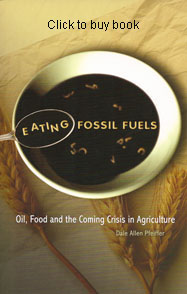Book Review continued:
Cuba's position at the time of the Soviet Union's fall was similar to North Korea's. Cuba relied on its sugar trade with the Soviet block countries for oil, natural gas, and many food stuffs. Without the Soviet Union's support and encumbered by the U.S. embargo, Cuba has been forced to live with less. In the first half of the 1990s, Cuba's agriculture output, like North Korea's, suffered badly, but in recent years, unlike North Korea, Cuba has found a way to come to grips with its energy deficits. Using a series of agricultural reforms that changed the way the land was managed by the state and the way the land was managed by the farmers, Cuba has made steady progress toward a new self-sufficiency through relocalized and sustainable food production. While Cuba is still a nation amid difficult times, it represents a light at the end of the petrochemical tunnel.
For Pfeiffer, Cuba is a real life model for what the entire world must learn to do. That is, steadily change over from industrial farming to a relocalized and sustainable husbandry. This is a refrain repeated by nearly all alternative farming commentators: minimize the use of fossil fuels in agriculture by using manure and other natural methods to eliminate the petrochemical additives and relocalize markets and the community to cut down on the long distances food must travel from field to table. The problem Pfeiffer foresees is that without the hydrocarbons we will be hard pressed to produce as much food as we do today. In the third paragraph of the book's sixth chapter, entitled "The Collapse of Agriculture," Pfeiffer asks the following question:
"The abundance of cheap food given to us by the Green Revolution has resulted in an exponential population boom. So we must now address a very serious question. Without the cheap, abundant supply of fossil fuels that has made possible the industrialization of agriculture, and that has allowed an explosion in food production at an energy net deficit of ten to one, has the human population exceeded the carrying capacity of the planet?"
This may be the most difficult question of our times: How many of us best fit the planet?
The United Nations projects a maximizing of Earth"s population at just less than ten billion, occurring sometime during this century. What this number really means, in terms of human transitions, is going past a population peak of maybe eleven billion and receding to a tentative equilibrium between nine and ten billion. There are many other projections in the population trend forum, but almost all scenarios include a peaking and a recession of some kind.
Pfeiffer suggests this painful period of population recession, whether sooner or later than the United Nations projects, could be ameliorated by forward thinking. If we could relocalize, if we could gather ourselves together at the grass roots level and practice sustainable agricultural as part of our community, we might gradually reduce population simply by the way we live. In other words, he offers a way to consciously work toward a population that would be optimum for the biosphere, instead of blindly stumbling toward some untenable maximum of human lives and dealing with the related problems later.
If we really want to be stewards of the planet and manage its resources, Eating Fossil Fuels reveals some of the difficult questions that must soon be asked. What would a thirty percent increase in our number mean to clean air, clean water, energy needs, and food reserves? Is six billion people already too many? How many is just right?
In his book, How Many People Can the Earth Support, noted demographics writer, Joel Cohen, suggests that five billion is a reasonable number. Buckminster Fuller felt that even 12 billion was possible if we managed the planet properly. Pfeiffer puts the number at two billion. This is a radical assessment to some. But if no preparation is made for climate changes and rapidly rising petroleum costs, the population question is likely to be answered in the most uncomfortable of ways. Changing the way we farm in a manner that also changes the way we live could lessen the pain while also healing an already stressed planet.
Can humans actually attain such awareness for themselves and the planet? Can humans really muster the will to change the status quo? Before external pressures do it for them? Pfeiffer has his doubts and a contained pessimism. But wouldn't an attempt at mindful management of the planet be better than allowing wars or famine to determine who lives and who dies or how resources are divided? Eating Fossil Fuels takes a courageous swing at answering this question.

Visit Dale Allen Pfeiffer's website The Mountain Sentinel.
